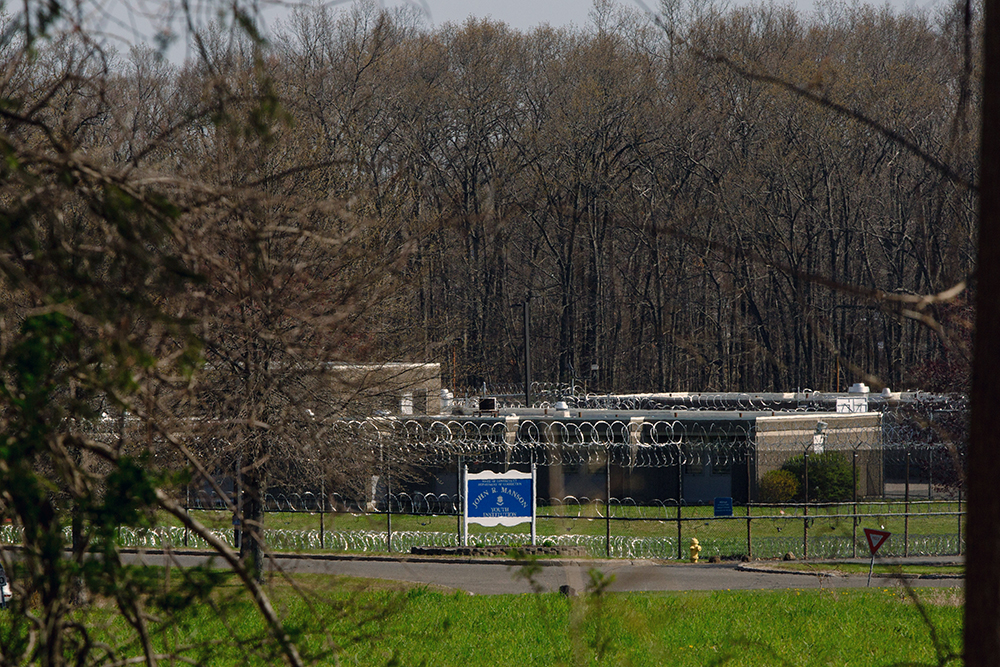The public won’t know their names, their ages nor why they were behind bars. They won’t hear their interaction with the person whose job is to check them for symptoms weekly. Nor will they hear the thoughts running through their minds as they sit in their cell, isolated from the unprecedented chaos outside.
They are the MYI Six, and the public won’t know anything about them except that the Connecticut Department of Correction (DOC) says they are six youth under 18 who qualify as medically vulnerable to COVID-19.
 All boys, ages 15 to 17, they are currently incarcerated at the Manson Youth Institution in Guilford, Conn. According to an email from a DOC spokesperson, there are no new precautions being taken specifically for the medically compromised six.
All boys, ages 15 to 17, they are currently incarcerated at the Manson Youth Institution in Guilford, Conn. According to an email from a DOC spokesperson, there are no new precautions being taken specifically for the medically compromised six.
In early April, the DOC announced that they’d identified six youth in their custody as medically vulnerable to COVID-19.
“Medically compromised members of the population are monitored in accordance with the departmental policies not specifically because of COVID-19. If obstacles are presented due to COVID-19, further measures will be taken,” the email said.
They are still housed in the general population because no one in the prison has shown symptoms, the email said. However, asymptomatic carriers of COVID-19 have been shown to transmit the virus to others.
As of publication, 317 DOC staff and 390 inmates in the adult system around the state have tested positive for COVID-19. Two inmates have died — including one who had been approved for discretionary release before he contracted the virus. MYI does not yet have any positive cases of COVID-19.
MYI is the only facility within the adult system designated specifically for young men 21 and younger. Youth 15 to 17 are separated from the rest of the population, those 18 to 21.
Youth who have been charged or adjudicated within the juvenile justice system are in the custody of the Judicial Branch and detained in two different facilities — one in Bridgeport and one in Hartford. Both have already had multiple positive cases of COVID-19.
How many are vulnerable?
Advocates said they believe the DOC has undercounted the number of medically vulnerable youth in their custody based on their knowledge of the youths currently at MYI, the fact that most are youths of color, and health care statistics and research about the prevalence of underlying conditions such as asthma and diabetes in black and brown communities.
“I don't think it can just be six young people that have previously existing medical conditions that are putting them at risk for contracting COVID-19,” said Christina Quaranta, the deputy director of the Connecticut Juvenile Justice Alliance.
She and other advocates want to know the criteria used to identify the youth so they can be sure all juveniles in the DOC’s custody who might be vulnerable to the virus have been identified and that the department can take the proper precautions, including considering them for early release to prevent them from contracting COVID-19, Quaranta said.
Throughout the pandemic, the department has not been communicative with advocates about their response, she said, and she doesn’t think they are doing enough to protect the youth they are responsible for.
“For us on the advocate side, they're not doing all that they can. They're not being transparent and there really isn't any urgency,” Quaranta said.
Susan Hamilton, director of Delinquency Defense and Child Protection at the Division of Public Defenders Services, doesn’t agree with advocates’ opinion that the DOC is not operating with any urgency during the pandemic. She said she thinks that everyone is doing their best given the circumstances.

A "no trespassing" sign is in front of the Manson Youth Institution in Guilford, Conn.
The seeming lack of transparency and action is further troubling since the DOC’s operational plan to protect their inmates from the virus involves what is tantamount to solitary confinement. Inmates, including juveniles, are restricted to their units in an attempt to prevent the spread of the virus since social distancing measures are nearly impossible inside prison. In-person schooling, visits and other rehabilitative programs are suspended, giving them very few reasons to be able to leave their cells.
Connecticut outlawed the use of solitary confinement on juveniles in 2017. But, in January 2019, the Office of the Child Advocate, a state agency whose job is to investigate and guard the welfare and rights of children, published a report outlining MYI’s continued use of solitary for minors. The facility is currently under federal investigation for the allegations.
“You just don't get a sense that anybody is actually upset about this or sees that it's going to be a problem,” Quaranta said. “It seems that they feel that maybe restricting movement, increasing solitary confinement, things like that are going to solve the problem. And it's not.”
She said the DOC doesn’t seem to be using the type of “out of the box” thinking necessary to successfully protect youth in their custody during the pandemic. She said their plans, briefly outlined during a Zoom presentation earlier this month to the Executive Committee of the Juvenile Justice Policy and Oversight Committee, left her and others feeling as though their questions — such as what the weekly medical check-in with the youths looked like, who’s sanitizing the facility and were they trained — were going unanswered.
During the presentation, the DOC revealed that they had six medically vulnerable youths. They also noted the number of youths 21 and under at MYI who would be eligible for release before the end of July, and that their medical discharge planner, who connects youth with relevant services in the community when they are released, was still working.
“It seemed to be, ‘This is what we do every day. You know we have the medical staff, we have the release unit, I'm not sure what you all expect of us,’” Quaranta said.
Office of Child Advocate wants more transparency
The presentation was given in response to a series of questions posed by the Office of the Child Advocate, the agency that wrote the report on the use of ongoing solitary confinement in MYI and other issues, at the start of the pandemic.
“We don’t want to beat anybody up. I think that the Department of Correction — and I really do mean this — I think they are doing the best that they can do because this is what they do,” said Heather Panciera, an assistant child advocate at the Office of the Child Advocate, about the DOC’s plans to protect the youth in MYI from the coronavirus.
Unlike other nearby states such as Pennsylvania and New Jersey, Connecticut Gov. Ned Lamont has declined to release inmates — either temporarily or permanently — as a way to prevent the spread of coronavirus within their prisons. His office did not respond to a request for comment for this story.
Child Advocate Sarah Eagan said in an emailed statement that they have recommended to state officials that they review the incarceration conditions for youth during the pandemic and that they figure out a way to quickly evaluate and release youths who can be safely returned to the community — medically vulnerable or not.
She emphasized the need for transparency.
“While we have maintained an ongoing dialogue with agency officials regarding these critical matters, it is essential that there be a structure for open reporting and accountability regarding the health and safety of all incarcerated youth,” Eagan wrote.
The Division of Public Defenders is advocating for the release of their clients in the juvenile and criminal justice systems, including a few of MYI’s medically vulnerable six. Hamilton of the Division of Public Defenders Services said she thinks the list they were given of medically vulnerable youths probably doesn’t include everyone it should — not because of the DOC’s criteria, but rather because the youths haven’t been diagnosed yet.
“I don't think they are withholding the information,” Hamilton said. “It wouldn’t surprise me that there are potentially more kids that might be at higher risk that are in the overall MYI population.”
And while she and the other public defenders are working hard to get as many youth — including the MYI Six — out as they can, Hamilton said she understands it’s not possible in every case. Everyone, including the DOC, is working hard under extraordinary circumstances, she said.
“We have to not be treating this as business as usual, and I really don't think anybody is doing that,” she said.
The Tow Foundation, headquartered in New Canaan, Conn., is a supporter of the Center for Sustainable Journalism.

Pingback: Seven Days in Solitary [5/4/20] | Solitary Watch